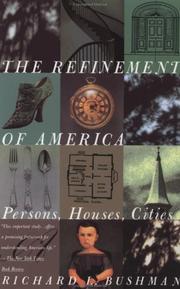Check nearby libraries
Buy this book

"In this illuminating analysis of early American society, Richard Bushman traces the introduction of gentility into the life of the nation. He explores the concern for stylishness, taste, beauty, and politeness that began to be felt in America after 1700, and examines how this concern changed our environment and culture." "Bushman makes clear that the quest for gentility, far from being trivial, was the serious pursuit of a personal and social ideal with sources in classical and Renaissance literature. In Europe, the growing interest in manners and beautiful environments was connected to the power of royal courts. In America, the transformation of architecture, furnishings, and wardrobes - from plain, rudimentary, and frugal, to decorative and sumptuous - was linked to the transfer of power to the colonial gentry. Gentility was the culture of the colonies' ruling elite." "After the Revolution, gentility spread to a broad middle class, as an essentially aristocratic culture was democratized. The change affected nearly every aspect of life. The spread of gentility turned the conduct of ordinary people into a performance. Courtesy books taught people how to hold their bodies, and how to dress, eat, and converse in a pleasing way. The wish to be pleasing came to encompass virtually every form of behavior and every aspect of the physical environment, from houses and yards to public buildings and the adornment of streets. Factories sprang up to supply a vast new market for furniture, dishes, curtains, and carpets. Cities and towns planted trees, landscaped parks and greens, and erected fashionable hotels and churches. All of these developments were part of a vast effort to present a refined face to the world and to create a new kind of society." "Bushman stresses that these visions of a more elegant life both complemented and competed with other American values associated with evangelical religion, republicanism, capitalism, and the work ethic. The melding with other values resulted in contradictions that were not easily resolved and that provided much cultural work for writers and theologians. Finally, he argues that gentility gained strength from collaboration with capitalism, but in a way that blunted class conflict. The combination of capitalism, republicanism, and gentility prevented the hardening of class consciousness. Instead there emerged a belief in the right of every citizen to membership in the middle class."--BOOK JACKET.
Check nearby libraries
Buy this book

Previews available in: English
Showing 2 featured editions. View all 2 editions?
| Edition | Availability |
|---|---|
|
1
The refinement of America: persons, houses, cities
1993, Vintage Books
in English
- 1st Vintage Books ed.
0679744142 9780679744146
|
aaaa
Libraries near you:
WorldCat
|
|
2
The refinement of America: persons, houses, cities
1992, Knopf, Distributed by Random House
in English
- 1st ed.
0394550102 9780394550107
|
eeee
Libraries near you:
WorldCat
|
Book Details
Edition Notes
Includes bibliographical references (p. 449-484) and index.
Previously published: New York : Knopf, 1992.
Classifications
The Physical Object
ID Numbers
Community Reviews (0)
Feedback?History
- Created April 1, 2008
- 11 revisions
Wikipedia citation
×CloseCopy and paste this code into your Wikipedia page. Need help?
| August 2, 2024 | Edited by MARC Bot | import existing book |
| November 16, 2020 | Edited by MARC Bot | import existing book |
| October 7, 2020 | Edited by ImportBot | import existing book |
| July 31, 2020 | Edited by ImportBot | import existing book |
| April 1, 2008 | Created by an anonymous user | Imported from Scriblio MARC record |










